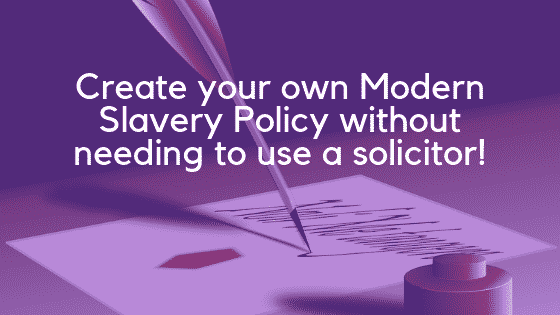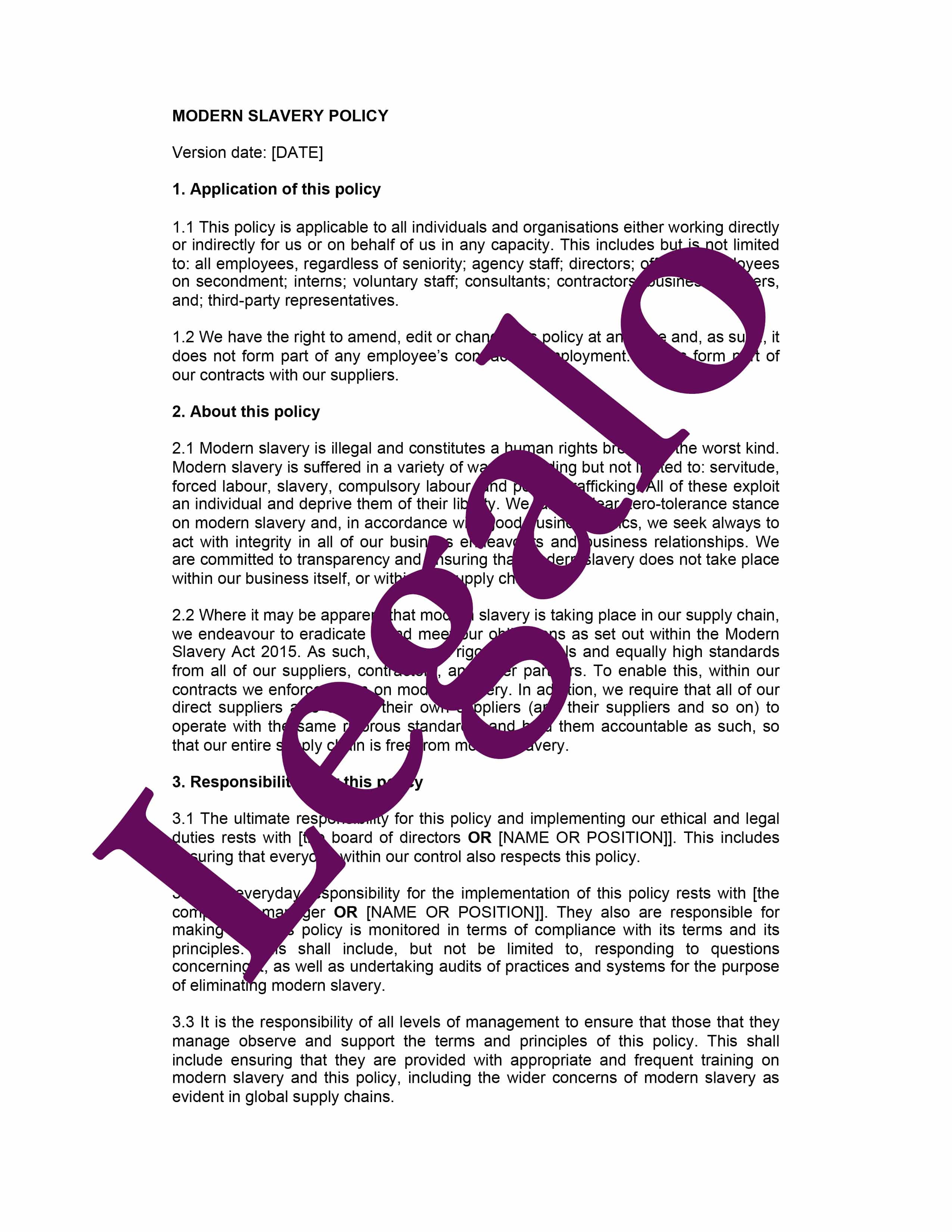Modern Slavery Policy
Our Modern Slavery Policy template:
- Demonstrate your high business ethics
- Expertly drafted by a UK solicitor
- Very quick and easy to use
- Covered by our money-back satisfaction guarantee

How Does It Work?
-
1. Download
-
2. Edit
-
3. Print
-
4. Sign
MD, Legalo Ltd; Solicitor; Notary Public
Slavery was banned in the UK in 1833 and yet sadly in some other countries serious human rights abuses continue to exist which are similar to, or the same as, slavery. This “modern slavery” (including human trafficking) can blight the supply chains of businesses buying goods from abroad. Our Modern Slavery Policy template makes it easy for you to put in place a policy that clearly sets out your stance on the issue, for the benefit of the public, your employees, customers and suppliers.
Under the Modern Slavery Act 2015 (see Wikipedia for basic details on what the Act does: https://en.wikipedia.org/wiki/Modern_Slavery_Act_2015) all businesses are encouraged to audit their supply chains and root out any such human rights abuses, but only large corporations are by law required to state whether they are doing so or not (if they have an annual turnover above a threshold, currently £36 million).
Putting in place a Modern Slavery Policy
If you are a supplier to a large corporation (or somewhere further down their supply chain), then you may be required by them to put in place such a policy and comply, including assuring them that you have eliminated slavery and similar abuses in your company and in any supply chain you use.
Whether you are obliged to do so or not, you can communicate your strong business ethics by adopting a Modern Slavery Policy and making it publicly available on your website. It is certainly good business practice to do so.
Our template makes is very easy for you and you can fill it out in just a few minutes. It comes with a guide on each clause and explains what you need to do to adapt the template for your business’s needs.
It has been drafted by our co-founder David, who is a solicitor with over 22 years experience. He has used his technical drafting ability in order to provide you with a high quality legal template that you can trust.
For more legal compliance templates, have a look at our Compliance section.
Practical issues
To implement the Modern Slavery policy, you need rather more work. Putting your policy in place is only the start. You will need to conduct an audit of your own business, your supply chains, and require your suppliers to audit and account to you as to their own modern slavery audits.
Guide to our Modern Slavery Policy
Our Modern Slavery Policy template is for use by any organisation that wishes, or needs, to put in place a modern slavery policy or a modern slavery statement.
Under the Modern Slavery Act 2015, a large company in the UK (of over £36 million turnover) must state annually if it is taking measures to eliminate slavery, trafficking and other human rights abuses in its company and in its supply chains worldwide. Clearly it cannot just say it is doing nothing, as that would be a PR disaster. This generally means that it must have a modern slavery policy in place and must require all of its suppliers (of all sizes) to abide by its modern slavery policy too. This means in turn those suppliers may well need a modern slavery policy of their own. Hence the reason for our template modern slavery policy
Paragraphs in this Modern Slavery Policy
At the top, fill in the version date – the month and year when adopted or updated.
Numbered clauses
1. Application of this Modern Slavery Policy
This clause sets out how the policy applies and that you can amend it from time to time.
2. About this policy
This clause explains that modern slavery is and how you must root it out of your supply chains. It states what standards you require of your suppliers in assisting you, so you can ensure your supply chains are clean.
3. Responsibilities for this policy
This clause states who is responsible for drawing up this policy, monitoring and enforcing it. In clauses 3.1, 3.2 and 3.3 select the option that applies in each case. Where it is the second option, then state the name or position of the person responsible.
4. Compliance with this Modern Slavery Policy
This clause addresses the employees and advises them of the role they need to play so that the spirit of the policy is observed in practice. It encourages whistle-blowing, so that employees may report any suspected breach and you can then deal with it. It confirms that you will protect the whistle-blower from retaliation.
In clauses 4.3 and 4.6, select the option that applies in each case. If the third option, then fill in the relevant position. If you do not have a whistle-blowing policy (one is available from Legalo), then delete the words in square brackets in clauses 4.3 and 4.6 that refer to your having one.
In clause 4.7, fill in the option that applies and, at the end of the clause, fill in the location an employee can find a copy of the business’s grievance policy, e.g. the website, HR team or staff handbook. (If you do not have one already, then you can buy one from Legalo.)
5. Awareness and communication of this policy
This clause explains that training should be provided. Then you can ensure staff, suppliers and other contractors are aware of the policy and what it entails. In clause 5.2, select which option applies – the latter, if you are taking a hard line on enforcing the policy.
6. Breaches of this Modern Slavery Policy
This clause explains the consequences if you find people breaching the policy. For example, this can be:
- disciplinary action against an employee; or
- termination of a contract with a supplier, other contractor or self-employed person.
So you are now ready to publish your policy on your website and send a copy to any customer you supply that has required you to have such a policy in place.



